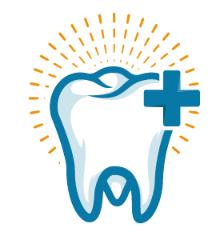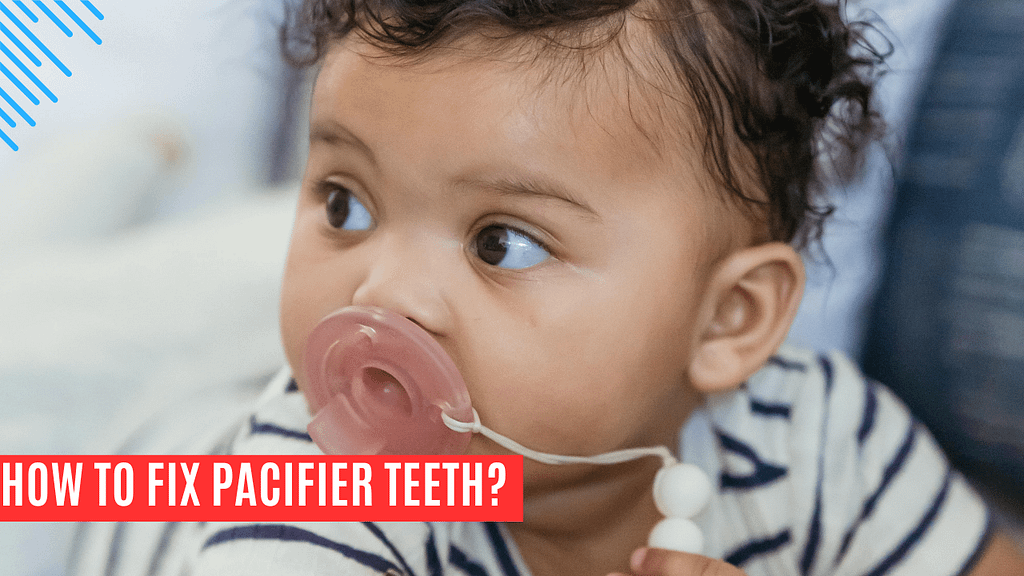Using pacifiers for toddlers is a common practice and lifesaver for many parents. A pacifier may help babies soothe their gums, but some kids also experience dental issues that result in pacifier teeth. Constant use of a pacifier grows a habit of sucking in kids, which leads to other habits such as thumb sucking and more.
A pacifier soothes a fussy baby but can be problematic if it continues for years. Fortunately, many kids outgrow this habit with some time, but others stay and look for alternatives such as thumb sucking. However, here is the guide about how to fix pacifier teeth and what dental issues parents can face after pacifier sucking in kids.
Moreover, follow our blog for more oral directions in kids while growing, passing through the teeth stages, pacifier teeth myth, how do pacifier teeth look like, and major differences before and after their use. Learn more about managing dental anxiety in kids, choosing a dentist who understands dental phobia, and will pacifier teeth correct themselves.
What Do Pacifiers Do?
Pacifiers are tools that are made up of rubber, plastic, or silicon given to the toddler or infants to distress by satisfying their need to suck. It is very beneficial for parents during their teething journey. A pacifier normally has three parts: a handle, a mouth shield, and an elongated teat.
They offer several benefits for fussy babies in pain with sore gums during teething. However, there are many benefits that they provide, such as:
- Help reduce the pain in nursing infants.
- Reduce sudden infant death syndrome.
- It soothes a crying infant.
- It acts as a temporary distraction.
- It might help your baby fall asleep quickly.
Read More: Clove Oil Use to Kill Tooth Pain Nerve in 3 Seconds Permanently.
Are Pacifiers Bad for Teeth?
Now comes the highly confusing statement: are pacifiers bad for baby teeth? What do pacifier teeth look like? Unfortunately, they cause issues in oral health if used for longer durations. According to the Canadian Dental Association, if babies use pacifier teethers after the permanent teeth have erupted, it causes alignment issues. In babies of 2 year old, pacifier use must be limited to prevent binky teeth.
From bite-size issues to teeth development, pacifiers could be more problematic. Additionally, there is a high chance that your baby will start relying on the pacifier. If your baby uses a pacifier to sleep, you might face crying spells in the middle of the night.
In addition, one of the disadvantages of using pacifiers is that they are prone to the risk of middle ear infections. Further, prolonged pacifier exposure causes disruptions during nursing.
If your baby is breastfeeding, there are times when you might need a pacifier, but daily practice can disrupt the routine. This is why it is advisable to introduce a pacifier only after you have become comfortable getting your baby latched on to your feed.
Do Pacifiers Cause Dental Problems?
As mentioned above, along with SIDS, dental issues are commonly caused by pacifiers in the kids. It leads to crooked or snaggle teeth, only treated with braces. Parents must learn about the age when a pacifier affect teeth.
In addition, with every single use, a pacifier is prone to attract several bacteria and viruses from the environment. If parents neglect the hygiene of a pacifier, it can also cause bacterial infection in kids’ mouths. Moreover, it can lead to bumps on the gums, which can lead to dental cavities, mouth cancer and other threatening complications. So, parents must offer only a sterilized pacifier if needed.
The American Academy of Pediatric Dentistry discourages pacifier use after age three. The ideal age for using a pacifier is six months to one year of age. Due to both oral and ear infections, prolonged use must be inhibited after a certain age.
Read More: Tooth Colored Restorations: Materials, Cost, Types & More.
How Do Pacifiers Affect Baby Teeth?
A pacifier and teeth have an old yet long relationship with multiple benefits. However, its use can be restricted, considering the possible side effects. Let’s discuss how pacifiers affect teeth and what happens to a pacifier’s mouth.
Here are the common issues that occur in babies who keep on using this tool after a specific age limit:
1: Open bite
Bite issues are prevalent among pacifier babies. Their alignment is disturbed, and teeth are angled outward, resulting in a wide-open bite. It also causes spacing issues between the front teeth and messes up the beautiful smile.
2: Crossbites
Another common issue in the teeth of infants and toddlers after using a pacifier is crossbite, which occurs when the upper teeth don’t fit right with the lower teeth. Mostly, they fit behind or inside the front teeth, which causes bite issues.
3: Buck teeth
Back teeth are common in people and mainly occur due to genetics. But, nowadays, the buck teeth result due to excessive use of pacifiers, causing protruding teeth.
4: Roof changes
Lastly, the pacifiers cause narrowing and misshaping of the mouth roof. It leads to several complications while treating the teeth with aligners and braces.
How Can I Stop My Child from Using the Pacifier?
Parents utilize this tool for their kids’ benefit, but inhibiting this habit becomes a nightmare. However, there are several ways by which parents can stop teeth damage by pacifier use. Depending on the age of the kids, there are different strategies. For instance, pacifier teeth for 1 year age, parents can successfully limit its use by replacing the pacifier with some components from food such as fruits and vegetables.
However, if the kid has outgrown the age of 1, their habit can be broken by attractive alternatives, such as awesome physical activities that capture their attention.
For example, by reading a book or by introducing a new toy to your kid, you can distract their attention. During this transition, be attentive to your kid and offer extra hugs and kisses to keep their mood reasonable.
For toddlers, weaning is the best strategy alternative to the pacifier. Moreover, at such an age, you can openly discuss the side effects of the pacifier and explain how it’s terrible for your teeth. Use any strategy, such as gradual or cold turkey, whichever works for you.
Furthermore, distract your kid with their favorite toys and fun activities. Never punish them for their desire to suck a pacifier. Instead, remain calm and deal with them with love.
How to Fix Pacifier Teeth in Toddlers?
If you suspect your kid has misalignments due to extended use of this tool, visit the dentist as soon as possible. A dentist can better recommend the needed treatment options by examining the teeth. Will pacifier teeth correct themselves?
Well,If you think a 2 year old pacifier teeth will correct themselves, the answer is yes, but the chances are low. If the pacifier teeth damage is addressed at the time and your kid stops using the pacifier, then there is a possibility. However, here are some ways to fix pacifier teeth shape:
1: Braces
Metal and colored braces are standard practices when it comes to correcting the misalignment of teeth. Braces offer several benefits, from correcting crooked teeth to making jaw adjustments. You can check the clear difference after using braces for pacifier teeth before and after treatment.
2: Palatal Expander
A palate expander is an oral device that widens the upper jaw. It maintains the natural position of teeth and jaws and corrects the alignments. Moreover, its usage depends on each case and varies from a few months to a few years.
3: Surgery
The last resort is surgery if there is a severe tooth alignment issue. Surgery makes the best solution for single and multiple teeth. Look for the pacifier teeth myth and reality discussion and then consult with your dentist to get deep insights about this treatment choice.
Read More: Laser Teeth Cleaning Vs. Traditional Deep Cleaning
Take away:
To sum up, if your kid is obsessed with pacifiers, this is the time to set some limits. If their teeth are already damaged, take your kid to the dentist as soon as possible and look for the options.
Follow our blog for more info about teething stages, snaggle teeth, and other shared concerns.
FAQs
At what age does a pacifier affect teeth?
A pacifier affects the teeth if the sucking habit continues till the age of three. The dentist recommends discouraging pacifier use after the age of one year. However, its prolonged use leads to dental issues at any age.
Do pacifier teeth correct themselves?
The pacifier teeth may correct themselves, but the chances are meagre. With timely decisions, they are easy to treat. Otherwise, it becomes challenging to realign affected teeth.
Will teeth go back to normal after the pacifier?
After using a pacifier teether for a longer duration in babies, most malocclusions resolve independently. If the habit continues, the orthodontics issues will last longer and require proper dental treatments.
What is a pacifier tooth?
It is a crooked tooth that result by extended use of the pacifier or prolonged thumb sucking. Before using pacifier, the teeth are normal which are primarily misaligned teeth after it with changes in the roof. Moreover, they require proper treatment using the aligners to straighten up the smile.
How to get rid of binky teeth?
There are several dental treatments that can help with the binky teeth such as using braces, clear aligners, and bite blocks. A professional dentist can guide you bets bout the right treatment according to your teeth condition.

